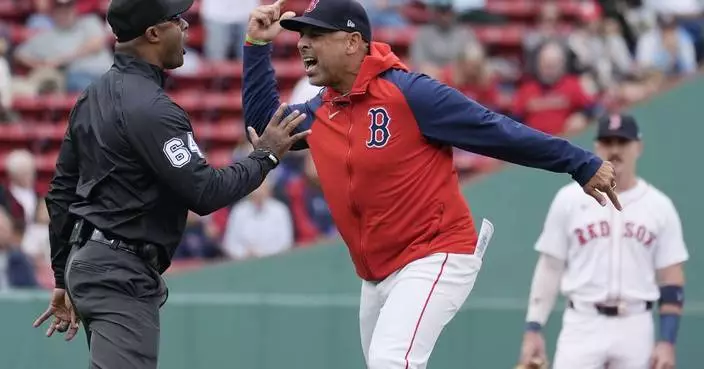Ta-Nehisi Coates always writes with a purpose, so naming his latest collection “The Message” is nothing if not on-brand. But what’s the actual message? Consisting of three pieces of non-fiction, the book is part memoir, part travelogue, and part writing primer. It covers his recent trips to Dakar, Senegal; Columbia, South Carolina; and various cities and towns in the Middle East.
He writes in the introduction that the essays fulfill a promise to a Howard University writing class he taught in 2022: “I bring my belated assignment… I’ve addressed these notes directly to you, though I confess that I am thinking of young writers everywhere whose task is nothing less than doing their part to save the world.”
Coates features snippets of his biography in each essay, but always returns to lessons for writers, as in this reflection during his first ever visit to Africa: “There are dimensions in your words — rhythm, content, shape, feeling... The accretion of imperfect, discomfiting life must be seen and felt so that the space in your mind, gray, automatic, and square, fills with angle, color, and curve.” These pilgrimages, for him, help ground his powerful writing about race. As he reflects on his visit to Gorée Island, the place from which tens of millions of Africans departed into a lifetime of slavery, he confesses to “welling up, grieving for something, in the grips of some feeling I am still, even as I write this, struggling to name.”
The second essay examines racism closer to home, as Coates journeys to a South Carolina town where the school board was considering banning his 2015 book “Between the World and Me” because, in part, students in an Advanced Placement English class felt “ashamed to be Caucasian” when they read it. Supporters of the teacher manage to show up in enough force to defeat the ban, but Coates sees in it the power of story. A middle-aged white teacher in Chapin, South Carolina, read his book — a letter to his teenage-son about the realities of being Black in the United States — and decided to use it as an example of how to write a persuasive essay. “We have lived under a class of people who ruled American culture with a flaming cross for so long that we regularly cease to notice the import of being ruled at all,” writes Coates.
The final, and longest, essay encompasses a 10-day trip Coates takes to the Middle East. Like his journey to Senegal, it’s his first time in the region, and the experience really opens his eyes. “Of all the worlds I have ever explored, I don’t think any shone so bright, so intense, so immediately as Palestine.” That’s because everywhere he looks he sees familiar signs of subjugation. The parallels between being Black in America and Palestinian in the Middle East are myriad. “The state had one message to the Palestinians within its borders...‘You’d really be better off somewhere else,’” writes Coates. But while it’s a message Coates clearly conveys in his essay, he realizes it’s not his story to tell. “If Palestinians are to be truly seen it will be through stories woven by their own hands — not by their plunderers, not even by their comrades.”
AP book reviews: https://apnews.com/hub/book-reviews
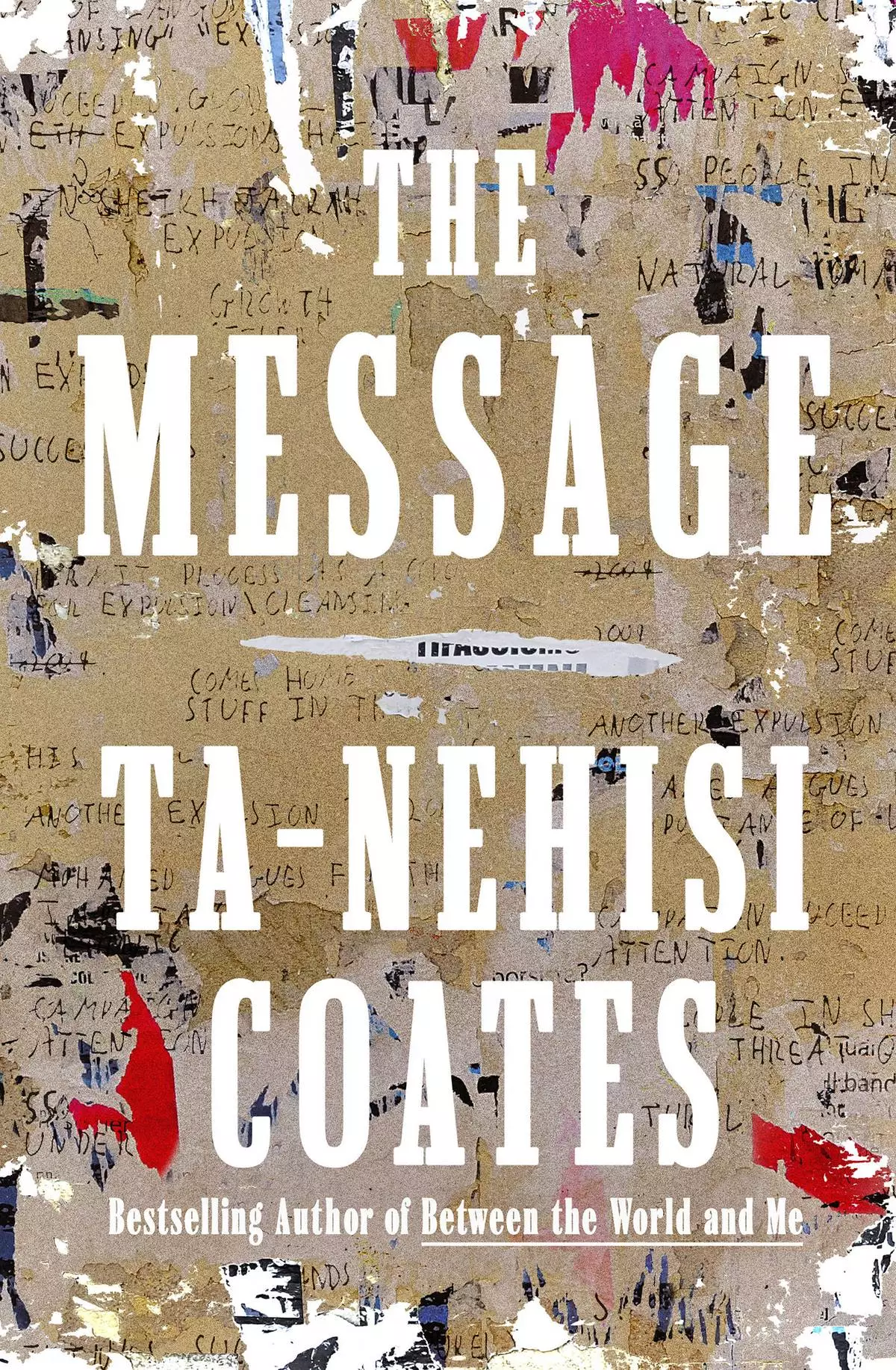
This cover image released by One World shows "The Message" by Ta-Nehisi Coates. (One World via AP)

This cover image released by One World shows "The Message" by Ta-Nehisi Coates. (One World via AP)
Stephen Curry got the question and didn't even have to think about the answer. Someone wanted to know what French words that the Golden State Warriors star picked up during his gold-medal experience at the Paris Olympics this summer.
“Nuit nuit,” Curry said.
Of course.
The hottest basketball move in the world this summer wasn’t a crossover dribble, or a stepback jumper, or some sort of no-look pass. It was the summer of “night night,” Curry's signature hands-to-the-side-of-the-face gesture, one that he breaks out when the game is over — basically, when he's put the other team to sleep. The whole world saw it after his dazzling stretch of four 3-pointers, the drama growing with each one, in the final couple minutes of USA Basketball's gold-medal win over France in August.
Inter Miami's Lionel Messi — only the biggest soccer star in the world — did the night-night a few weeks ago. At the Presidents Cup last weekend, Si Woo Kim celebrated a chip-in by doing the night-night (a bit prematurely, given that the U.S. went on to win the event yet again) and at the Democratic National Convention, even Warriors coach Steve Kerr capped his speech in support of Vice President Kamala Harris by making the gesture.
And as this NBA season starts — all teams are now in training camp — it's still the rage.
“I've seen it at the DNC, I've seen it at the Presidents Cup in golf, I've seen it all over, Messi did it,” Curry said. “I think Steve takes the cake in knowing that was a good time to pull it at the end of a great speech and getting some good energy in the building. Si Woo Kim, shout out to you. I appreciate him doing it — even though I told him he’s got to remind himself about time and score and knowing when you pull a night-night out, you got to win.”
The night-night was epic.
The four shots that preceded the gesture — the four shots that delivered gold to the U.S. — they're still the talk of the NBA, too.
Warriors teammate Brandon Podziemski has seen Curry pull off all sorts of remarkable feats, both in practices and games.
And as he watched the gold-medal game, he had a hunch Curry had something special coming.
“I just really thought, like, this is Steph being Steph,” Podziemski said. “And what I mean by that is, he just gets in these modes and these phases where, like, I don’t know what happens. You just give him the ball and you just let him do his thing and that’s it.”
That's exactly what the Americans did for those couple of minutes. He tried passing the ball to Kevin Durant a couple of times; Durant just immediately sent it back his way. Devin Booker had a layup chance; he threw the ball back beyond the arc to Curry instead. It was his time. They knew it. France knew it. Podziemski knew it.
“I see it all the time in practice,” Podziemski said. “He just lets his body take over.”
Karl-Anthony Towns was on his couch with about 3 minutes left in the gold medal game, watching just like the rest of the world.
He didn't stay seated for long.
“It got me off the couch,” said Towns, the four-time NBA All-Star who's about to enter his 10th season. "I am 28 going on 29. I’ve been in the NBA 10 years. I’ve played against this man four times a year. I’ve never had a man make me feel like I was 15 years old and I've got to get off the couch and shoot some damn basketballs. I’ve never — never — had that.”
Towns said what made it even better was that Curry made four different shots, four different ways, four different sets of footwork involved.
“It was the greatest shooting expo I've ever seen,” Towns said.
Miami guard Tyler Herro saw earlier in the Olympics that Curry was struggling a bit with his shot.
He knew that wasn't going to last. Sure enough, he was right.
“It's the preparation that he does, the mindset that he has,” Herro said. “It didn't surprise me. Everyone knows how good he is and how hard he works and prepares. That’s kind of what I kind of try to take away from him, what he does, how he works, how he does everything game speed.”
Herro knows the shots — and the night-night — will be replayed forever.
“I mean, the influence he has, not only on basketball in America, but everywhere," Herro said. “They're doing it in FIBA games. Messi's doing it. I can only imagine what the rest of the world is like. That's Steph. It's so crazy.”
AP NBA: https://apnews.com/hub/nba
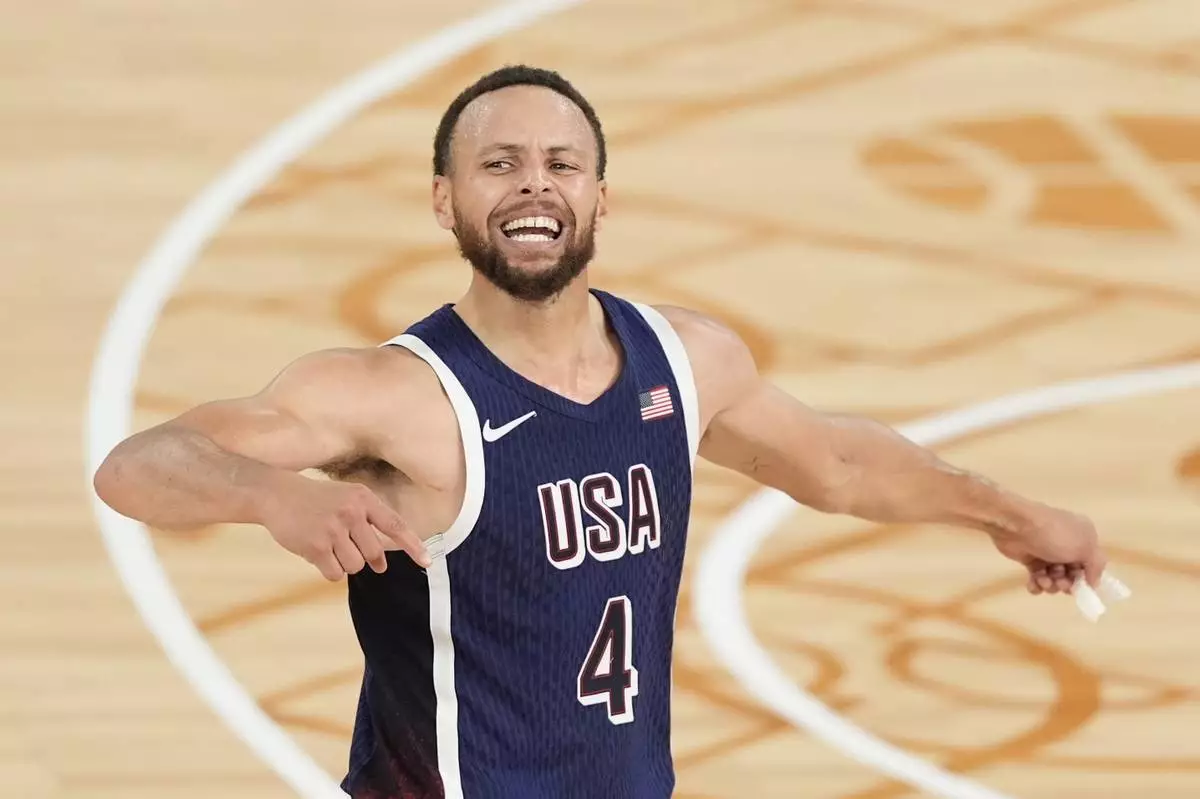
FILE - United States' Stephen Curry (4) reacts after winning a men's gold medal basketball game against France at Bercy Arena at the 2024 Summer Olympics, Aug. 10, 2024, in Paris, France. (AP Photo/Michael Conroy, File)
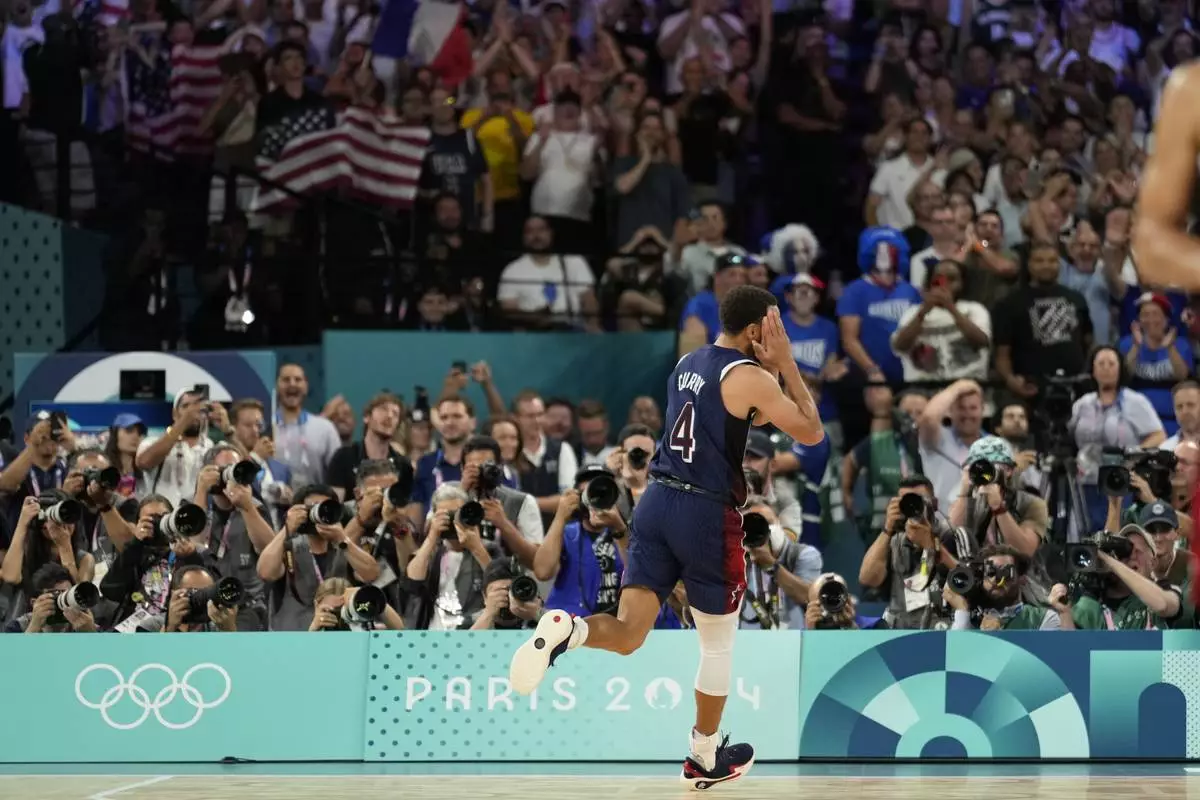
FILE - United States' Stephen Curry (4) celebrates after beating France to win the gold medal during a men's gold medal basketball game at Bercy Arena at the 2024 Summer Olympics, Aug. 10, 2024, in Paris, France. (AP Photo/Mark J. Terrill, File)
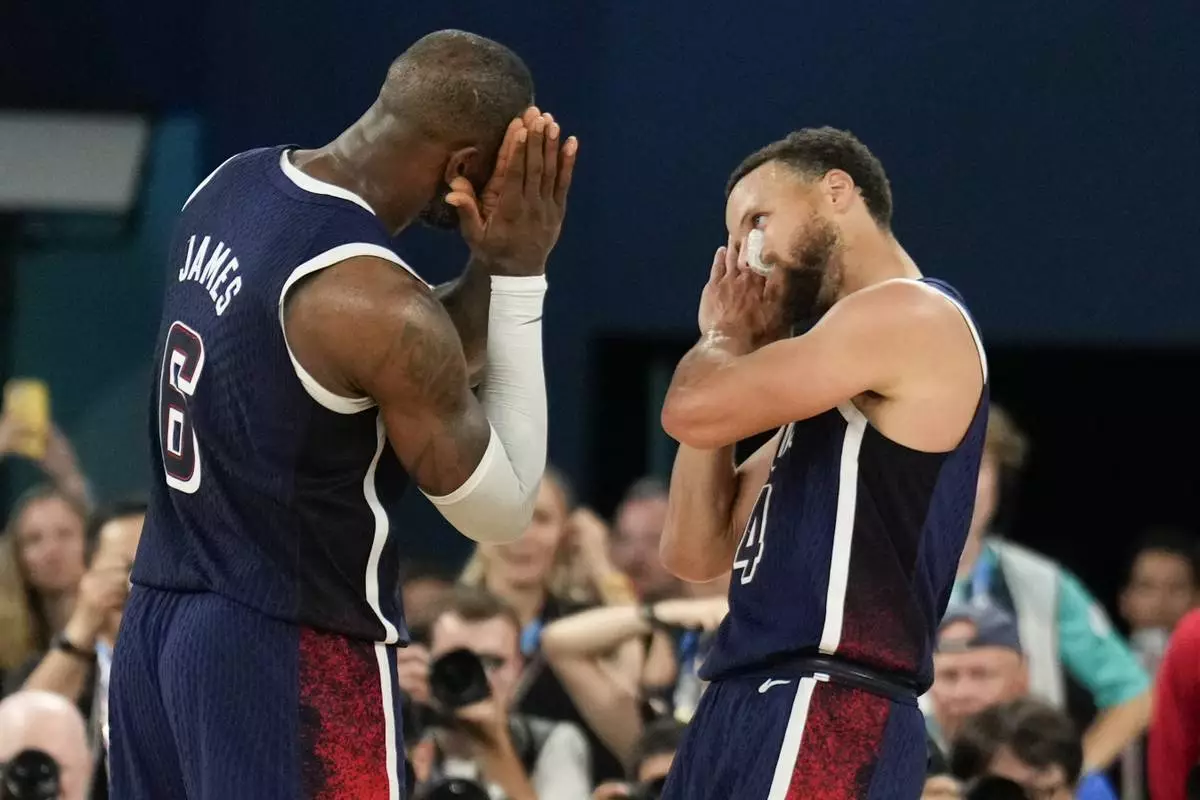
FILE - United States' Stephen Curry (4) and LeBron James (6) celebrate after beating France to win the gold medal during a men's gold medal basketball game at Bercy Arena at the 2024 Summer Olympics, Aug. 10, 2024, in Paris, France. (AP Photo/Mark J. Terrill, File)














